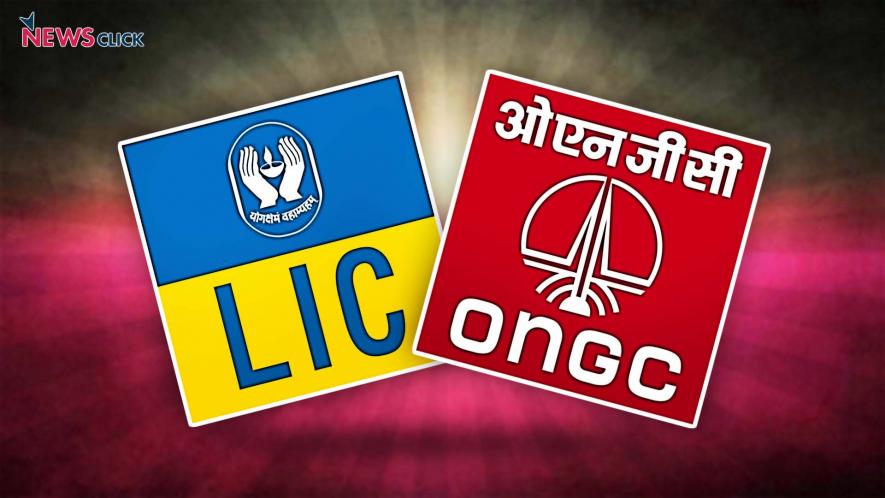BJP's Plan To Sell Residual Government Shares in Air India To LIC Is A Bad Move

What happens when a profitable and cash-rich public sector company — the Life Insurance Corporation of India (LIC) — is forced by the central government to use its surplus to buy shares of another public sector company — Air India (AI) — which is hugely indebted and 'sick' and is already being sold off to private buyers?
It is reported that the BJP-led NDA government plans to sell the residual stake of the central government in AI to the LIC and other state-owned insurance companies, after the March 28 announcement to sell off 76 per cent of the equity share capital of AI, along with management control, held by the government to the private companies.
The ostensible reason for AI's disinvestment is the huge debt burden of over Rs 52,000 crore and heavy net losses, even though Air India has been making operational profits for the past three years and has never defaulted in its loan repayment.
How Air India was deliberately brought to its knees by the destructive policy decisions of the previous Congress-led UPA government — which included buying excessive aircrafts at huge loans and giving away of lucrative routes to private airlines — is another story.
But despite the government sweetening the deal by vowing to bear 50 per cent of the debt burden, no private player has yet come forward to take up the offer — which includes 100 per cent equity stake in AI’s subsidiary Air India Express Limited as well as AI's 50 per cent equity stake in joint venture AISATS.
The one Indian company, IndiGo, that had expressed interest publicly has reportedly changed its mind — saying it was only interested in acquiring AI's international operations and it does not have "the capability to take on the task of acquiring and successfully turning around all of Air India’s airline operations.”
Air India continues to hold extremely lucrative routes and slots internationally, with around 17 per cent market share in the overseas services.
But why is the NDA planning to sell its remaining stake to LIC? What will this mean?
Out of the government's 24 per cent remaining share in the hitherto "national" airline — 4 per cent will be given out to permanent employees under the employee stock ownership plans (ESOPs), whereby an employee stock pool will be created.
After creating the ESOP pool, the government will try to sell the residual 20 per cent stake to LIC — and to other state-owned insurance companies or financial institutions, because an insurance company can hold only up to 15 per cent shares in another company, as per rules of the Insurance Regulatory and Development Authority of India (IRDA).
According to a Business Standard report, the move is meant to allay the concerns of potential private investors since "any government holding in Air India may discourage investors".
But it will serve another purpose for the government, which has been on a disinvestment spree, selling off profit-making Central Public Sector Enterprises (CPSEs), even in critical sectors like defence.
In three and a half years since coming to power, the Modi government sold off national assets worth Rs 1.25 lakh crore — more than what the Congress-led UPA had sold off (worth Rs 1.14 lakh crore) in a decade of its rule.
If LIC is compelled to buy 15 per cent shares of AI — and being a company owned by the central government, it won't have a choice — the money LIC spends will go to the central government coffers. The BJP-led NDA would use this cash to reduce its deficit and presumably to meet its revenue expenditure (not even capital expenditure that has long-term gains for the country, given that Modi is already hell-bent on selling off national assets).
This money will not even go to Air India, which could have used the cash to bail itself out to some degree.
This cash to be spent by LIC — which is a Central Public Sector Enterprise — is generated out of the productive activities of the company, is not a gift of government grants or such. In order to maintain its health, LIC should be using this money — which would obviously be a hefty amount — for the purpose of its own expnasion, development and modernisation.
Instead, this money will be added to the consolidated funds with the government — which would presumably be used to write off 'bad' loans of corporate borrowers and other such corporate-friendly expenditures, which will have no impact on the people of the country.
This amounts to the BJP-led NDA using the cash reserves of a healthy public-sector company to enrich the central coffers, while burdening the healthy company with shares of a 'sick' company that is finding no takers.
Already there have been calls from the industry to privatise LIC despite it ruling the roost in the life insurance market, even after entry of the private companies into the market since1999-2000.
And while an argument can be made that LIC already owns stakes in several blue-chip companies – a majority of them public-sector, but also private ones, buying shares in AI, which has been reduced to status of a 'white elephant', is not going to do much for LIC's health.
Speaking to Newsclick, V Ramesh, general secretary of All India Insurance Employees' Association, said, "The government is trying to squeeze cash from LIC, even as it continues to privatise public-sector enterprises. LIC is very prudent in its investments, and holds shares in a large number of both public-sector and private-sector companies. But it obviously cannot say no if it is asked to buy AI shares."
"Since LIC goes for long-term investments, buying AI shares will not immediately affect LIC's health as it can wait till, and if, AI's fortunes turn around. But getting LIC to buy shares of a sick company that nobody seems to want is not good for the company. The government would deprive LIC of its own money that the company could have used for updating its capacity, for its development and expansion. But investing in a loss-making company effectively means your money is wasted," he added.
Ramesh said while the central government had already begun disinvesting general insurance companies, the day was not far when LIC too would be privatised. He said LIC had paid a dividend of Rs 2,250 crore in the 2016-17 fiscal.
In January 2018, in a somewhat similar move, the Oil and Natural Gas Corporation (ONGC) was made to buy the government's entire 51 per cent stake in Hindustan Petroleum Corporation Limited (HPCL) at a price of Rs 36,915 crore — a move which resulted in ONGC becoming indebted.
"ONGC was a debt-free company. Since ONGC did not have enough surplus funds, it was compelled to take a loan in order to purchase HPCL, under government pressure. Now, ONGC has a debt burden of more than Rs 35,000 crore. And while there has been no change, as of yet, in the company's status as a public sector company, the money ONGC borrowed went to the central government's coffers," said Tapan Sen, general secretary of Centre of Indian Trade Unions (CITU).
Ramesh said, "The employees of LIC are opposed to privatisation of public-sector companies. We condemn the privatisation of Air India. LIC is a very strong company, and we will fight tooth and nail to defend LIC in the future, come what may."
Get the latest reports & analysis with people's perspective on Protests, movements & deep analytical videos, discussions of the current affairs in your Telegram app. Subscribe to NewsClick's Telegram channel & get Real-Time updates on stories, as they get published on our website.
























